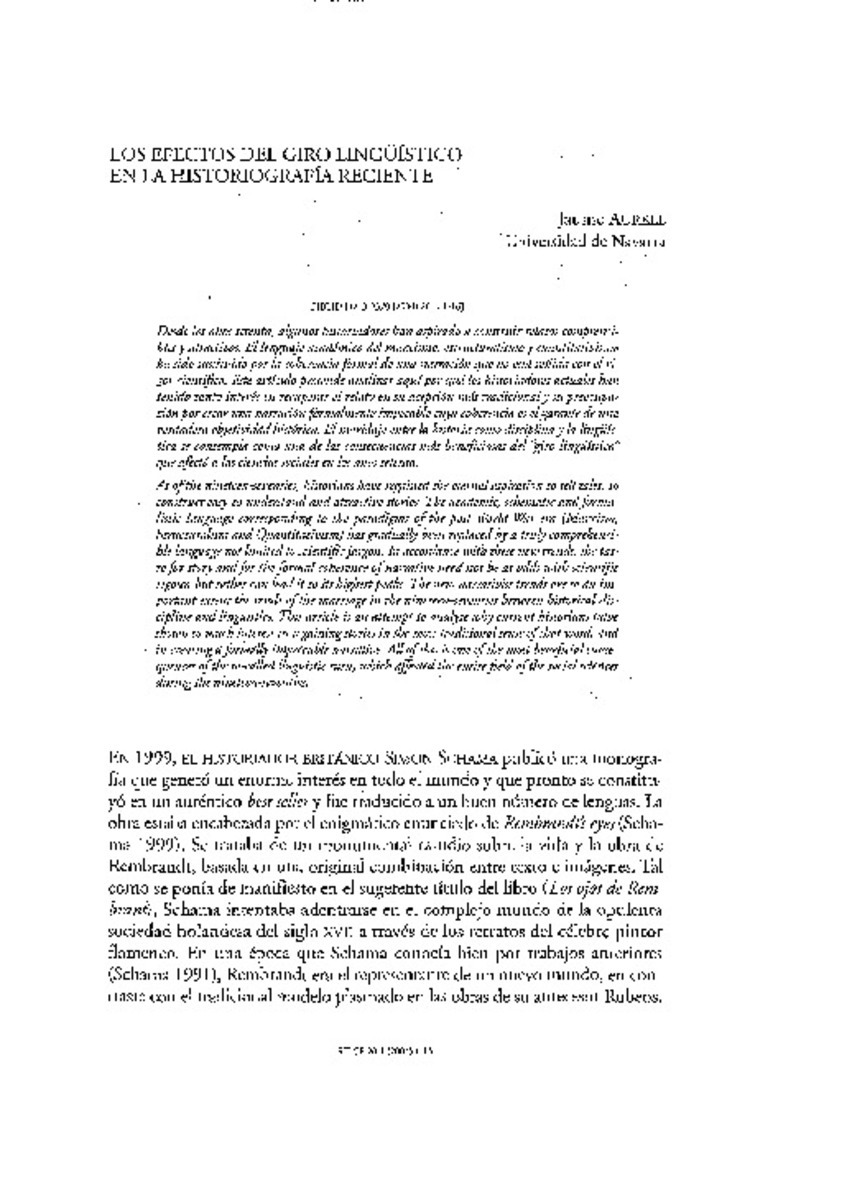Full metadata record
| DC Field | Value | Language |
|---|---|---|
| dc.creator | Aurell-Cardona, J. (Jaume) | |
| dc.date.accessioned | 2009-12-18T18:34:50Z | - |
| dc.date.available | 2009-12-18T18:34:50Z | - |
| dc.date.issued | 2004 | - |
| dc.identifier.citation | Rilce 20.1 (2004): 1-16 | es_ES |
| dc.identifier.issn | 0213-2370 | - |
| dc.identifier.uri | https://hdl.handle.net/10171/5405 | - |
| dc.description.abstract | Desde los años setenta, algunos historiadores han aspirado a construir relatos comprensibles y atractivos. El lenguaje académico del marxismo, estructuralismo y cuantitativismo ha sido sustituido por la coherencia formal de una narración que no está reñida con el rigor científico. Este artículo pretende analizar aquí por qué los historiadores actuales han tenido tanto interés en recuperar el relato en su acepción más tradicional y su preocupación por crear una narración formalmente impecable cuya coherencia es el garante de una verdadera objetividad histórica. El maridaje entre la historia como disciplina y la lingüística se contempla como una de las consecuencias más beneficiosas del "giro lingüístico" que afectó a las ciencias sociales en los años setenta. As the nineteen-seventies, historians have regained the eternal aspiration to tell tales, to construct easy-to-understand and attractive stories. The academic, schematic and formalistic language corresponding to the paradigms of the post-World War era (Marxism, Structuralism and Quantitativism) has gradually been replaced by a truly comprehensible language not limited to scientific jargon. In accordance with these new trends, the taste for story and for the formal coherence of narrative need not be at odds with scientific rigour, but rather can lead it to its highest peaks. The new narrativist trends are to an important extent the result of the marriage in the nineteen-seventies between historical discipline and linguistics. This article is an attempt to analyse why current historians have shown so much interest in regaining stories in the most traditional sense of that word, and in creating a formally impeccable narrative. All of this is one of the most beneficial consequences of the so-called linguistic turn, which affected the entire field of the social sciences during the nineteen-seventies. | es_ES |
| dc.language.iso | spa | es_ES |
| dc.publisher | Servicio de Publicaciones Universidad de Navarra | es_ES |
| dc.rights | info:eu-repo/semantics/openAccess | es_ES |
| dc.rights | info:eu-repo/semantics/openAccess | es_ES |
| dc.subject | Historiografía reciente, giro lingüístico, relato. | es_ES |
| dc.subject | Recent historiography, linguistic turn, story. | es_ES |
| dc.title | Los efectos del giro lingüístico en la historiografía reciente | es_ES |
| dc.type | info:eu-repo/semantics/article | es_ES |
| dc.identifier.doi | 10.15581/008.20.26710 | es_ES |
Files in This Item:
Statistics and impact
Items in Dadun are protected by copyright, with all rights reserved, unless otherwise indicated.






